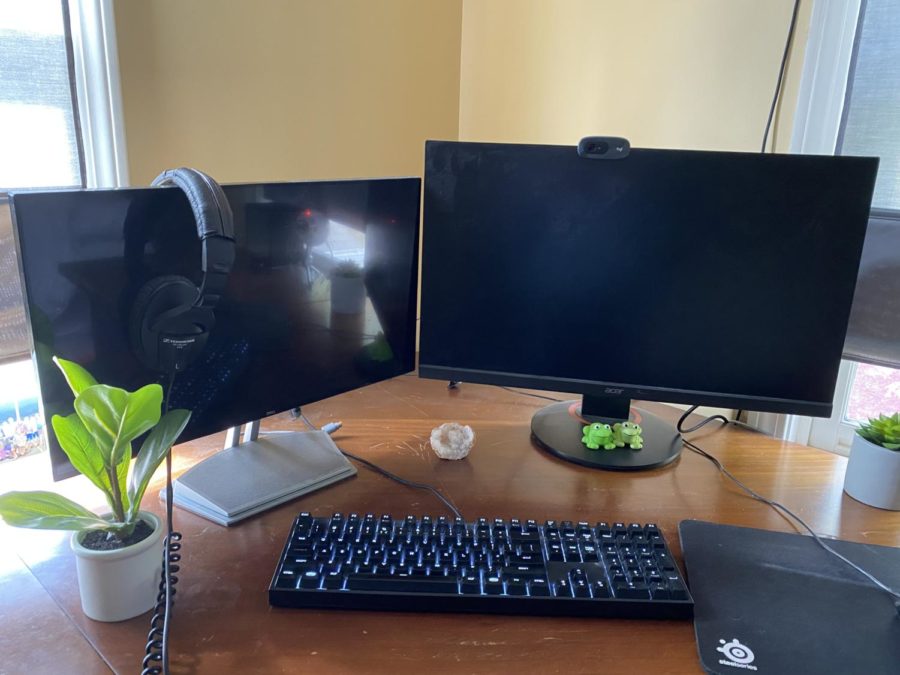Can we produce productivity?
June 10, 2021
Imagine this: you sit down after a day at school, ready to knock out your homework and have the rest of the night to do as you please. You take out your paper, ready to work, and suddenly your phone buzzes. But instead of reaching for your pencil to start working, you reach for your phone. Before you even know it, an hour has passed, and you decide to do your work tomorrow instead. As a student, this is a situation I, and many others, are all too familiar with. Oftentimes, I am ready to complete my work, but something distracts me and causes me to lose my focus. So for this week, I decided to make a change and re-evaluate the way I study to be a more productive student.
During one of my distraction-induced procrastination sessions, I stumbled across a YouTube video of a computer science and engineering student named James Scholz, who livestreams himself studying for twelve hours a day. Fascinated, I clicked his channel and saw that he had been livestreaming his studies for a minimum of twelve hours a day, every single day, for over a year without fail. Luckily, a video on his channel saved me from having to wonder how he’s capable of working so hard without becoming burnt out. He published a video explaining how he studies for such a long period of time, and credited the Pomodoro technique with his successes. I ended up researching the technique, and found out that it is a method of studying which incorporates breaks into work periods in timed intervals. For instance, you work for 25 minutes, and then take a 5 minute break, repeating this process until after the fourth “pomodoro,” when you take a longer 30-45 minute break. I thought that this method is miles better than my current studying/procrastination habit, and decided to give it a try.
To begin my journey with the Pomodoro technique, I created a list of my current assignments, in order of importance. Luckily, I did not have much homework due tonight, only a Calculus assignment, so, I thought that this would be the perfect trial run for my first time using the Pomodoro technique. Before setting the timer, I cleaned off my workspace, making sure I had ample room to work and no present distractions. I even put my phone in another room to prevent myself from being distracted. I put on my headphones, turned on some music, set my timer, and got to work.
Although I thought I would struggle with being able to focus on the task at hand, by minimizing my amount of distractions, I was able to accomplish over half of the assignment by the end of my timer. For my five minute break, I got myself a glass of water and went to another room for a quick change in environment. I opted not to use my phone during the break so as to not get sucked into the endless scrolling we all too often find ourselves doing. I went back to my desk and set the next timer for 25 minutes, but I completed the first assignment with 9 minutes to spare. Normally, my calculus assignments can take upwards of an hour due to getting distracted by various things (my phone especially), but this technique helped me minimize these distractions and complete my assignment more efficiently.
I’m sure that most people are familiar with the feeling of being distracted by something, whether it be your phone blowing up with texts, or the thoughts of something happening later in the day, but I think attempting to minimize the distractions is the best way to deal with them. For instance, put your phone in another room, or write down anything you think of that distracts you so you can return to it later. “Manage distractions: keep your phone away from your sight. Research has shown that even having a phone off, but still next to you as you work, causes you to become more distracted. It is best to leave the phone in your backpack or in another room.
When working on the computer to research, try to stay on topic, don’t check email, or click on another site that is not related to your topic, etcetera,” said Maria St. Pierre, the health and wellness teacher at Hollis-Brookline High School. “Distractions are very difficult to deal with. The phone and social media are the biggest problems. I’ve been teaching a long time, even before cell phones were invented, and students have always had lots of work to do, but the fancier our phones got and the more social media was introduced, the more students complained of being stressed and not being able to keep up with their homework,” said St. Pierre.
For my next attempt with the Pomodoro technique, I had to study for my Spanish class and review some comprehension questions for a quiz the following day, so I sat down and tried the process again. This time, I tried it with a 30 minute study period and a 10 minute break, thinking that I could use the extra five minutes to get focused and “in the zone” with my studying. It worked very well, and I noticed that once I was able to get focused and keep my mind from being occupied with other things, I used the time more effectively. After the first study period, I felt confident with my work and called it a night. Normally I’ll be very easily distracted, but putting my phone away and keeping things neat and organized has seemed to be helpful.
Both teachers and students agree that cell phones are a major distraction for us these days. “When I’m bored or tired in class it keeps me from paying attention which is a habit I need to break. As well as this, I also find myself focusing on other assignments or tasks during lectures or lessons I’m not really invested in,” said AnnMarie Tremblay ‘21, a senior at HBHS, as well as a member of student council. “I’m pretty good at catching myself when my attention starts to stray from what is going on in class presently. I normally place my phone upside down or in my bag, and start to tune back into what I’m learning.”
Other students credit lack of sleep to be a negative influence on their focus and productivity. “If I’m tired, I get a lot more easily distracted and find it very difficult to finish my work,” said Josh Parr ‘21, a senior at the high school.
Over this past week, I’ve learned a lot about the way I study. Finding a method of studying that works for you is the best way to maximize your productivity, whether it be the Pomodoro method or something else. Keeping an orderly workspace with all your necessary materials, as well as getting rid of anything else distracting are also things I’ve found to be extremely helpful. But remember, as Mrs. St. Pierre said, “If all your focus is on being productive, and not on the other aspects of your life, you may get things done, but not in a fulfilling way. After all, we are people, not robots.”













